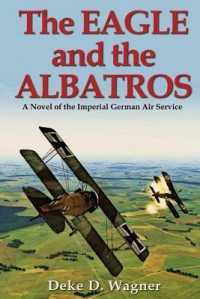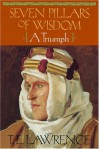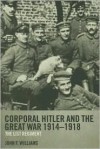Currently reading
THE EAGLE IS AN ALBATROS

"THE EAGLE AND THE ALBATROS" is a novel centered upon a Bavarian (Willi Wissemann) serving as an officer in the Imperial German Air Service during the First World War. In some respects, it bears a similarity to the novel, 'The Blue Max', which was a best-seller in the 1960s.
The story begins in the spring of 1916, when Wissemann, freshly graduated from flight school (where he showed himself to be a highly skilled pilot) and a brief stint in a Flugpark in Valenciennes (ferrying planes to and from active combat units) is assigned to a 2-seater unit tasked with carrying out photo-reconnaissance and artillery spotting missions on behalf of the Army at the Front opposite British forces in the Somme River valley. No sooner than Wisseman arrives at his unit, his commanding officer (who is on non-flying status owing to a wound he sustained in combat) puts him in charge of a mission against the enemy. That struck me as so utterly INAUTHENTIC! What commander in his right mind would put a newly arrived pilot --- who knows nothing about prevailing frontline conditions and may not be wholly proficient in flying the aircraft with which the unit is equipped --- in charge of leading a combat mission?! Automatically, the novel lost some credibility with me. (From the First World War pilot memoirs I've read, normally a new pilot was tasked with flying a series of 'familiarization flights' to get a feel of the area of the Front where the unit was stationed, as well as learning to fly in formation with his squadron mates before being permitted to fly combat patrols.)
Notwithstanding that, the story of Willi Wissemann's time at the Front -- first with a 2-seater unit and later as commander of a Bavarian fighter unit flying against the French in the Champagne sector of the Front during the winter and early spring of 1917 --- is well-told. Wissemann is roughly 10 years older than the average pilot (30 years old in 1917) and had previously served with a front-line infantry unit from the outset of the war. He was also fairly well-travelled, in a relationship with a woman from a well-born, influential family (whose father detested him because of his humble origins in Bavaria), and spoke fluent French. It was this language skill that would put Wissemann into a precarious position when he volunteers to take on a mission flying a spy by night deep into enemy territory which would cost him his freedom --- and possibly his life. To say more would throw out too many spoilers.
On the whole, I liked reading "THE EAGLE AND THE ALBATROS" and appreciated the author's insertion of a glossary containing a lot of aviation terms unique to both the First World War and the Imperial German Air Service. I also enjoyed the air combat sequences, which were highly descriptive and very well-written. What I didn't like was the depiction of Wissemann's sweetheart Ilse von Linkhof., She often came across as this two dimensional woman constantly pining for her man at the Front, with melodramatic emotions boiling over. I think the author should have developed her character more to give the reader a fully-realized, multi-faceted woman. Not a cardboard sketch of one. For that reason --- and a few others, including some spotty writing --- I can only rate "THE EAGLE AND THE ALBATROS" with 3 stars. On the whole, it's a good novel. But I felt it could have been much better.













